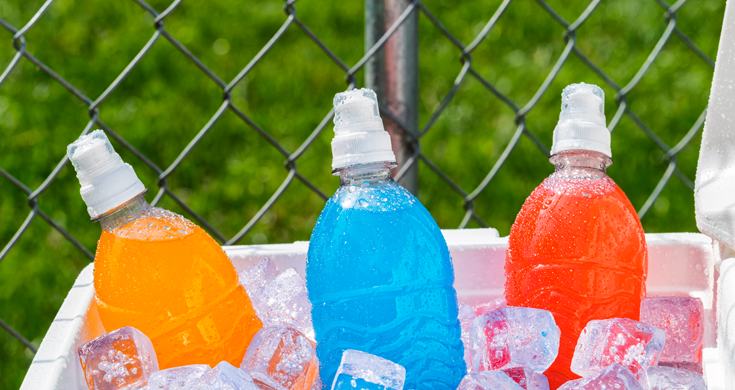More kids are drinking sports drinks in place of sodas according to a recent survey on the American Academy of Pediatrics website “Although daily consumption of sports drinks has decreased overall, sugar-sweetened sports drinks remain popular, with the majority of high school students drinking them at least weekly,” the study’s authors concluded.
So how safe are these drinks for children? Most parents have been warned of the health risks to kids who drink sodas and other beverages high in sugar and calories, but many may not be aware of issues with sports drinks.
Sports drinks are often advertised as a healthier alternative to carbonated beverages. However, in spite of their benefits, they’ve come under criticism recently from nutritionists who are concerned about their safety, particularly for children.
Why Drink Sports Drinks?
When people sweat during exercise, they lose electrolytes and carbohydrates, which are necessary for normal heart and body cell function. Sports drinks such as Powerade, Gatorade, All-Sport, and Hydra Fuel are specifically made with a large percentage of electrolytes and carbohydrates so that they can replenish the body with these crucial elements after heavy physical activity.
But according to medical experts, sports drinks aren’t necessary for those who engage in routine amounts of physical activity. In fact, they can actually be detrimental, because they often contain just as many calories—and just as much sugar—as soda. In fact, some sports drinks contain as many as eight teaspoons of sugar in a 20-ounce bottle.
Should Kids Ever Have Sports Drinks?
According to several recent studies, a surprisingly high number of American kids are switching from popular sodas to sports drinks. The study referenced earlier shows that the percentage of high school students drinking sports drinks at least once a week has continued to rise gradually over the last few years, with recent numbers reaching nearly 57 percent. However, around 10 percent of the kids who are drinking sports drinks daily aren’t physically active at all. These kids are drinking sports drinks while watching others play sports on TV. And while doctors speculate whether it’s a question of association—rather like a couch potato wearing a favorite team shirt but never getting out to exercise—parents are faced with concerns about childhood obesity and other related health issues such as diabetes.
According to pediatricians, older kids should be allowed to have sports drinks—but only during times when they’re involved in a high-energy, physical activity such as playing soccer. Generally speaking, sports drinks are beneficial to athletes of all ages because they can quickly replenish lost sodium, potassium, and other necessary minerals. However, doctors warn that it typically takes a high level of athleticism to justify reaching for a sports drink. In most cases, if your child isn’t playing four quarters of football or engaging in heavy play on the tennis court, water is best.
Should Parents Restrict Sports Drinks?
According to physicians and nutritionists, parents need to do their part by restricting sports drinks for their kids unless their kids are active athletes. Conditions that justify consuming sports drinks for older kids include physical activity that involves running, biking, or playing a high intensity game (such as basketball, soccer, or hockey) for a certain length of time (some cite an hour or more).
During normal physical activities, parents should provide their kids with plenty of water—including vitamin-infused or flavored water (as long as it doesn’t contain sugar or unhealthy additives). You can also make plain water more interesting by adding lemon, lime, and other natural citrus flavors.
Also, be sure to talk to your child about why water is, except in cases of heavy athleticism, a healthier choice. Most kids will appreciate your treating them “like an adult” by honestly explaining the situation to them. Plus, you can help make them feel a bit more grown-up by telling them that you’re glad they’re old enough to understand the importance of making a healthier lifestyle choice.






















































































































